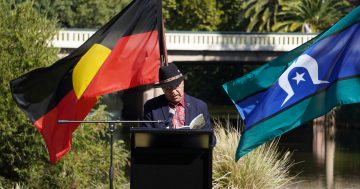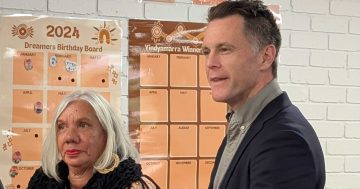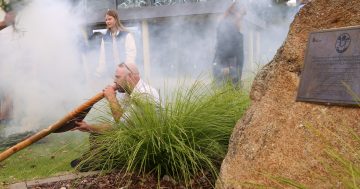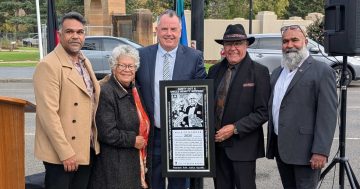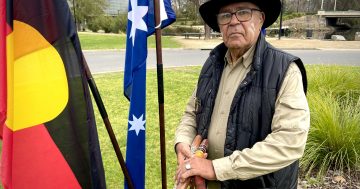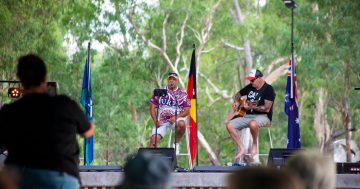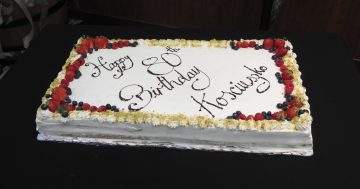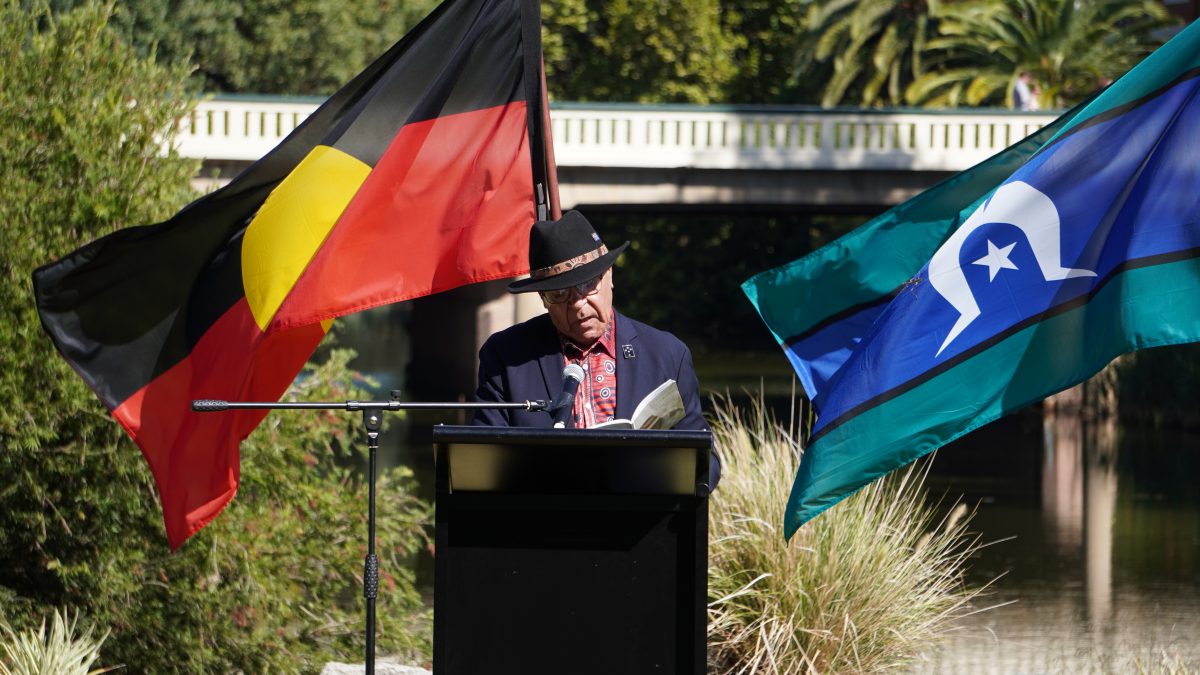
As Uncle Huey Whyman reflected on his personal experiences of the Stolen Generations, a gust of wind blew through the Indigenous and First Nations flags, knocking down the Australian flag. Photo: Jarryd Rowley.
On Tuesday morning (13 February), Wagga elder Uncle Huey Whyman addressed the large crowd that had gathered at Wollundry Lagoon amphitheatre to reflect on the importance of National Apology Day, 16 years on from Kevin Rudd’s historic address.
Standing on a small stage before the three Australian flags, Uncle Huey recalled the traumas suffered by him and other members of the Stolen Generations.
He described National Apology Day as only a “stepping stone”, and as he recalled his personal experiences of the Stolen Generations a gust of wind struck the banners, blowing down the Australian flag and leaving the elder framed by only the Aboriginal and Torres Strait Islander flags.
While it was a moment of pure coincidence, it felt like a metaphor for Uncle Huey’s speech as he said there was still a long way to go to repair the damage done to Australia’s First Nations peoples.
The National Apology Day event began with Aunty Cheryl Penrith welcoming the strong crowd to the lagoon, detailing the significance it has to the Wiradjuri people. She shared her memory of 13 February, 2008, and the importance of the national apology to Indigenous peoples.
“I was driving back from Tamworth and I was between Coonabarabran and Gilgandra,” she said.
“I had to pull over because Kevin Rudd was speaking. The tears started rolling down my face for everyone that I see here today. We’ve all been impacted, our families and communities, by the Stolen Generation.
“Days like today, it’s good to remember, it’s good to think about all of our old people here this morning.”
Aunty Cheryl reminded the audience about the Cootamundra Girls Home, a facility that assimilated young female First Nations people, and explained that the actions of the Stolen Generations had been undertaken on Wagga’s doorstep.



“It’s something that we should never forget about,” she said.
“It’s a call to action to ensure something like this never happens again and for Aboriginal and non-Aboriginal people to move forward together.”
Following Aunty Cheryl’s Welcome to Country, she invited fellow elder Uncle Huey to the stand. Uncle Huey provided a personal story about his and his family’s experiences during the Stolen Generations.
He recounted how his siblings were taken by welfare officers to an adult prison while he and his parents were at work. Upon leaving the prison, his siblings were taken to be assimilated elsewhere.
It wasn’t until several years later that Uncle Huey saw his family members again, where they were playing football with white teammates.
“I was lucky to reconnect with my family,” he said.
“Today we are family but we haven’t bonded as a family.”
After Uncle Huey’s recollections, he gave a brief history of First Nations people following colonisation, explaining that despite the first colonies arriving in 1788 and Australia becoming a recognised country in 1901, the culture of First Nations people dated back 65,000 years, making it the oldest in the world.
“Come forward a man called Phillip, who walked upon this country after landing in Sydney Cove and raised the flag,” he said.
“The Gadigal people of the Eora nation stood back and watched as he declared the land vacant. One hundred and 13 years later, our nation got its birth certificate and white men decided what our constitution should look like. It was devoid and vacant and not inclusive of Aboriginal people.
“The colonist psyche is alive and well today in this country and will continue to be alive and well, but Aboriginal and Torres Strait Islander people are strong and resilient and have risen from the ashes many times and continue to rise today.”
The official event concluded with Uncle Huey reading out the original apology issued by then-prime minister Mr Rudd in 2008, with a smoking ceremony and traditional dance rounding out the proceedings.







